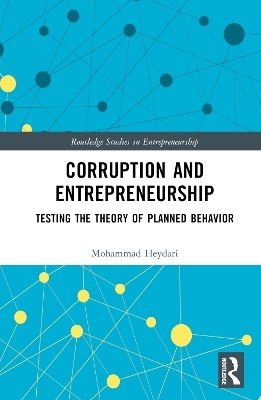
Corruption and Entrepreneurship
Testing the Theory of Planned Behavior
Seiten
2024
Routledge (Verlag)
978-1-032-58996-1 (ISBN)
Routledge (Verlag)
978-1-032-58996-1 (ISBN)
This book examines corruption as a collective behaviour problem for entrepreneurs. In particular, it considers the Azjen’s theory of planned behaviour (TPB) to explain perceived corruption and its effects on entrepreneurship.
This book examines corruption as a collective behavior problem for entrepreneurs. In particular, it considers Azjen’s theory of planned behavior (TPB) to explain perceived corruption and its effects on entrepreneurship.
Heydari argues that behavioral intentions are shaped by variables such as attitude, subjective norms and perceived behavioral control. He proposes the novel Heydari Behavioral Synthesis Theory (HBST) model and applies it to two case studies to highlight the institutional, individual and societal factors that may inhibit entrepreneurial behavior. He concludes that corruption may persist not just because of difficulties in monitoring and prosecuting, but because it is systemically pervasive and discourages individual countermeasures. He closes by looking at anti-corruption policies and outlining future research directions.
Arguing that widespread corruption may be theoretically mischaracterized in the literature, this book is of interest to policy-makers, researchers and postgraduate students in the fields of management science, industrial and organizational psychology, entrepreneurship and corruption studies.
This book examines corruption as a collective behavior problem for entrepreneurs. In particular, it considers Azjen’s theory of planned behavior (TPB) to explain perceived corruption and its effects on entrepreneurship.
Heydari argues that behavioral intentions are shaped by variables such as attitude, subjective norms and perceived behavioral control. He proposes the novel Heydari Behavioral Synthesis Theory (HBST) model and applies it to two case studies to highlight the institutional, individual and societal factors that may inhibit entrepreneurial behavior. He concludes that corruption may persist not just because of difficulties in monitoring and prosecuting, but because it is systemically pervasive and discourages individual countermeasures. He closes by looking at anti-corruption policies and outlining future research directions.
Arguing that widespread corruption may be theoretically mischaracterized in the literature, this book is of interest to policy-makers, researchers and postgraduate students in the fields of management science, industrial and organizational psychology, entrepreneurship and corruption studies.
Mohammad Heydari, School of Economics and Management, Tongji University, Shanghai, China.
1. Introduction to the Theory of Planned Behavior 2. Methodology 3. From Intention to Action: Application of the Theory to a Case Study 4. Moderators in the Theory of Planned Behavior 5. Greasing or Sanding the Wheels? 6. Corruption as a Collective Behavior 7. Corruption as a Collective Action Problem and Policy Implications 8. Extension and Empowerment of the Theory
| Erscheinungsdatum | 05.04.2024 |
|---|---|
| Reihe/Serie | Routledge Studies in Entrepreneurship |
| Zusatzinfo | 29 Tables, black and white; 26 Halftones, black and white; 26 Illustrations, black and white |
| Verlagsort | London |
| Sprache | englisch |
| Maße | 156 x 234 mm |
| Gewicht | 530 g |
| Themenwelt | Mathematik / Informatik ► Mathematik ► Finanz- / Wirtschaftsmathematik |
| Recht / Steuern ► Strafrecht ► Kriminologie | |
| Sozialwissenschaften | |
| Wirtschaft ► Volkswirtschaftslehre ► Wirtschaftspolitik | |
| ISBN-10 | 1-032-58996-5 / 1032589965 |
| ISBN-13 | 978-1-032-58996-1 / 9781032589961 |
| Zustand | Neuware |
| Haben Sie eine Frage zum Produkt? |
Mehr entdecken
aus dem Bereich
aus dem Bereich
eine anwendungsorientierte Einführung
Buch | Softcover (2023)
Springer Gabler (Verlag)
CHF 69,95
Buch | Softcover (2023)
De Gruyter Oldenbourg (Verlag)
CHF 41,90


